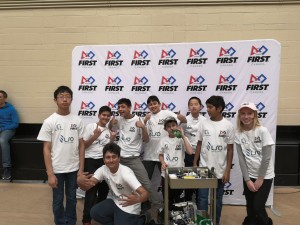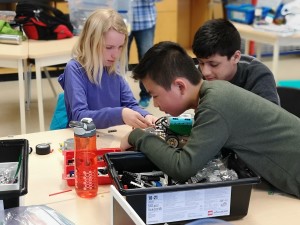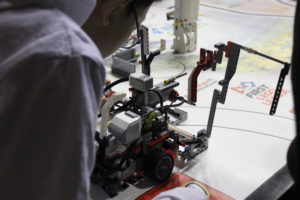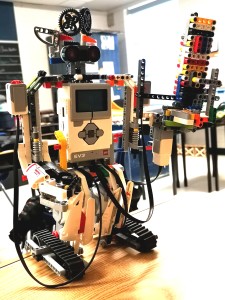The structure of the activities in the curriculum mimics the engineering design process used by scientists and engineers in many industries in conjunction with the preparation of a planned robotics competition in the Great Toronto Area. Each pr oject starts with a design brief explaining the challenge, uses videos of robots in action to make real-world connections, and culminates in a final project that can be shared and presented. Throughout the process, students gain and use knowledge of science, technology, and mathematics as they engineer a solution. This structure is designed to help students develop the 21st-century, creative-thinking, problem-solving, teamwork, and communication skills required for success in school and beyond.
oject starts with a design brief explaining the challenge, uses videos of robots in action to make real-world connections, and culminates in a final project that can be shared and presented. Throughout the process, students gain and use knowledge of science, technology, and mathematics as they engineer a solution. This structure is designed to help students develop the 21st-century, creative-thinking, problem-solving, teamwork, and communication skills required for success in school and beyond.
The curriculum will lead students to learn programming through different fun challenges. Furthermore, a robotics competition component is added so that students can be motivated to learn more skills.
Key Learning Values:
- Learn and use engineering design process skills
- Participate in robotics competitions in the Great Toronto Area;

- Understand the core concepts of technology
- Plan and manage activities to develop a solution to complete a project.
- Understand the role of troubleshooting, invention and innovation, and experimentation in problem-solving
- Demonstrate creative thinking and construct knowledge using technology
- Use digital media and environments to communicate and work collaboratively
- Develop basic teamwork while preparing for competition
- Improve communication skills through team-based projects
In the training program, all students are REQUIRED TO BRING THEIR LAPTOPS, Macbook, Chromebook or iPad.
Guidelines of Program
- Junior Robotics I
Intro to Programming:
This course will introduce the programming concepts using the EV3 Brick and DRONES. Motors will be used to make different turns and further control robots’ behaviour by adding sensors. Obstacle courses, dancing, sweeping robots, machine gun programming and related drone programming will enhance the students’ learning in programming sensors. Teamwork and communication are key to learning.
concepts using the EV3 Brick and DRONES. Motors will be used to make different turns and further control robots’ behaviour by adding sensors. Obstacle courses, dancing, sweeping robots, machine gun programming and related drone programming will enhance the students’ learning in programming sensors. Teamwork and communication are key to learning.
- Junior Robotics II
After learning the basic use of sensors in the  previous level, students will be introduced to the concept of decisions using switches and nested switches with multiple sensors and gain even better control of the robot’s behaviour. They will also be introduced to the use of variables and apply them in a program to collect data.
previous level, students will be introduced to the concept of decisions using switches and nested switches with multiple sensors and gain even better control of the robot’s behaviour. They will also be introduced to the use of variables and apply them in a program to collect data.
Location: 2210 Dunwin Dr., #1, Mississauga, ON L5L 1C7
Junior Robotics I & II – Full Year (once a week):
-
- 6:00 – 7:30 pm, Thursday nights, October 3rd, 2024 to June 12th, 2025
- Junior Robotics I, October 3rd to January 30th, 2025;
- Junior Robotics II, February 6th to June 12th, 2025
- 1:00 – 2:30 pm, Saturday afternoons, October 5th, 2024, to June 14th, 2025
- Junior Robotics I, October 5th to January 25th, 2025;
- Junior Robotics II, February 1st to June 14th, 2025
- 6:00 – 7:30 pm, Thursday nights, October 3rd, 2024 to June 12th, 2025
Program Cost (before tax):
-
- Junior Robotics I & II, Thursdays, $805
- Junior Robotics I, $419
- Junior Robotics II, $475
- Junior Robotics I & II, Thursdays, $805
-
- Junior Robotics I & II, Saturdays, $660
- Junior Robotics I, $340
- Junior Robotics II, $393
- Junior Robotics I & II, Saturdays, $660
**A monthly payment option is also available for program registration
**Teacher-to-student ratio: 1:6
** Program Fee is subject to tax

